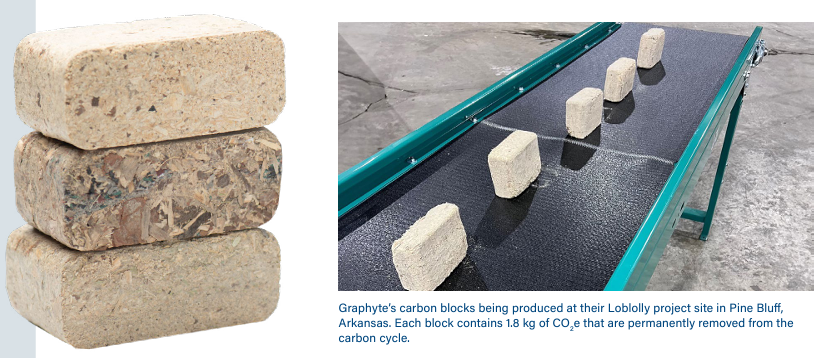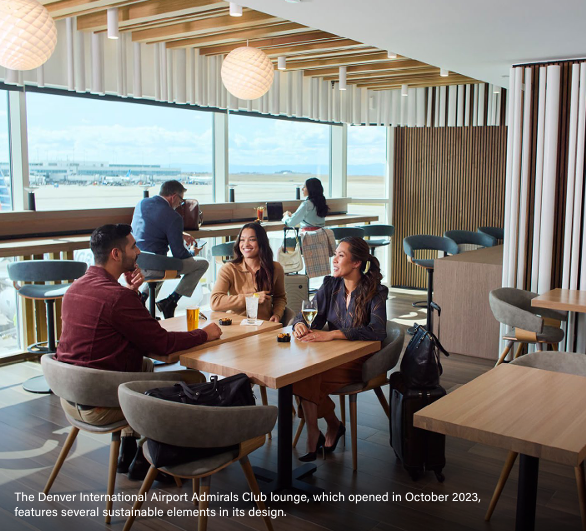Pioneering Offsets and Carbon Removal Technologies To Address Aviation’s Residual Emissions at American Airlines
Originally published in American Airlines' 2023 Sustainability Report
Voluntary Carbon Markets
Aviation is regarded as one of the sectors that is hardest to abate in terms of climate impact. Many of the decarbonization technologies needed do not yet exist, are not yet economically feasible or are not expected to scale quickly enough to achieve the insector reductions needed to reach net zero by 2050. As a result, to meet the goals of the Paris Agreement, the aviation sector will need to rely on carbon offsets and removals to neutralize residual emissions. The availability of high-quality offsets and removals requires a well-functioning voluntary carbon market and investment in innovation to strengthen the reputation of this marketplace.
How American is helping accelerate solutions
Reducing emissions within our operations is and will remain American’s priority. To date, we have not purchased any offsets as part of advancing our net zero commitment, but we recognize that carbon offsets and removals will need to play a future role in eliminating aviation’s residual emissions.
We are helping to accelerate and scale the CO2 removal market as the inaugural customer of Graphyte, whose innovative carbon casting process removes and stores CO2 permanently and cost-effectively. (See page 26 for more information.) American also partners with Cool Effect, a leading nonprofit provider of carbon offsets, to give our customers the opportunity to purchase offsets.
The Potential
- Necessary for addressing residual emissions for hard-to-abate sectors like aviation
- Can create cobenefits in areas such as air and water quality, biodiversity, human health and job creation
- Can bring social and economic benefits such as human health improvements and job creation in rural communities
Actions Needed
- Collaboration among market participants to agree on standards and verification to promote integrity
- Sound public policies and oversight for effective functioning of the market
- New financing models to mobilize more capital and increase participation in the voluntary carbon market
The Challenges
- Supply of quality, robust and verifiable carbon offsets
- Cost of carbon removals — and the need for technological innovation to bring down costs
- Degree of permanence of removals
- Verifying additionality, meaning the project only exists because of funding from carbon markets
Accelerating Low-Cost, Permanent Carbon Removal
Graphyte, backed by Breakthrough Energy Ventures, is a carbon removal startup that is pioneering a new pathway for low-cost, permanent carbon removal. Graphyte’s Carbon Casting process leverages readily available biomass, such as residues from timber and farming operations, that have already captured significant CO2 from the atmosphere through photosynthesis. The biomass is then dried to prevent decomposition, converted into dense carbon blocks, wrapped in an environmentally safe polymer barrier and monitored in a state-of-theart underground storage facility. Relative to existing carbon removal approaches, Carbon Casting permanently removes and stores CO2 using significantly less energy and at a substantially lower cost. In early 2024, Graphyte began operating the largest carbon removal facility in the world, its Loblolly facility in Arkansas.5
In 2023, American signed a deal with Graphyte to purchase 10,000 tons of permanent carbon removal to be delivered in early 2025, making us its inaugural customer.
Mitigating the Climate Impacts of International Aviation Through CORSIA
The Carbon Offsetting and Reduction Scheme for International Aviation (CORSIA) regulates emissions from international aviation, and American has endorsed its goal of achieving carbon-neutral growth in emissions after 2019. Airlines and other aircraft operators will offset any growth in CO2 emissions above a revised 2019 baseline established in the wake of the COVID-19 pandemic. In 2023, American and other airlines did not face offsetting obligations under CORSIA, as international flight volumes were still below prepandemic levels, but we expect that we will need to purchase carbon offsets to comply with our obligation for CORSIA’s first phase, which covers 2024–26 emissions. While we would prefer to meet our CORSIA obligations by increasing our use of SAF, we recognize offsets will also play a role. American will continue to monitor the offsets market in preparation for implementing our purchase strategy.
Through American’s partnership with Cool Effect, our customers can purchase carbon offsets. Cool Effect uses more than 90% of each offset dollar to fund a portfolio of carbon projects that aim to protect and conserve our planet’s resources. Learn more at cooleffect.org/american-airlines.
Sustainable Operations
While we are keenly focused on reducing the carbon footprint of our flights, our other environmental sustainability efforts extend to the ways in which we design and build facilities, our approach to recycling, use of renewable energy, adoption of environmentally friendly materials and much more.
Our Environmental Policy Statement, which was updated in May 2023, articulates American’s commitment to developing and implementing sustainable business practices designed to address climate change, efficiently use natural resources, reduce waste, prevent pollution, reduce noise, conserve biodiversity and help stop deforestation.
In 2023, we reached the goal we set in 2019 of sourcing 2.5 million gigajoules (GJs) of cost-competitive renewable energy to power our operations. Originally targeted for 2025, we accomplished this feat two years ahead of schedule. American purchased 673,176 GJs of electricity from renewable sources for our operations in north Texas and at Dallas Fort Worth International Airport (DFW) during the year. Both were 100% powered by renewable energy. As of April 2024, American was the highest-ranked U.S. airline — and 44th company overall — on the EPA’s Green Power Partnership Fortune 500® Partners List.
Incorporating sustainability into our building designs and airport lounges
Many of our facilities across the United States have received Leadership in Energy and Environmental Design (LEED) certification, a globally recognized symbol of sustainability achievement. Three buildings at our corporate headquarters campus are LEED Gold certified, including the Skyview 6 hospitality complex that opened in January 2023, Skyview 7 and Skyview 8. Our campus incorporates several other environmentally friendly features, including 90 acres of preserved woodlands and 9.3 miles of walking trails.
We have taken a sustainable approach to our new and redesigned Admirals Club lounges as well, using locally sourced wood whenever possible and focusing on their use of natural light and energy-efficient LED lighting. As a result, our Admirals Club at Denver International Airport, which opened in October 2023, is pursuing LEED Gold certification. Our recently expanded Admirals Club at LaGuardia Airport is LEED Silver certified, and the Admirals Club that opened in September 2023 at Newark Liberty International Airport also incorporates many sustainable elements into its design.
American has undertaken many initiatives across our Admirals Club lounges in recent years, including switching from plastic to compostable flatware and transitioning to a compostable straw that is available upon request only. We have begun testing reusable flatware in selected lounges, and our bottled water brand, JUST Water, comes in a carton made from 88% plant-based materials. We have also discontinued the mailing of plastic Admirals Club membership cards and physical welcome kits in favor of a digital-only approach.
Reducing aircraft noise
American is committed to addressing the concerns that local communities raise around aircraft noise. For example, we participate in several airport community roundtables on this topic, and we received a 2022 gold award from the Los Angeles International Airport Fly Quieter Program. We have also voluntarily retrofitted all pre-2014 Airbus A320 jets in our fleet with fuel vent vortex generators, which help reduce aircraft noise.
American continues to meet or exceed International Civil Aviation Organization (ICAO) noise certification standards as well. ICAO standards currently specify that operators can fly Stage 3, Stage 4 or Stage 5 aircraft. All our mainline and regional fleet meet Stage 4 noise certification levels, and 20% meet Stage 5 noise certification levels.
Identifying opportunities for composting and reducing food waste
Our new catering facility at DFW, which opened in 2023, was also built with sustainability in mind. The largest airline catering kitchen in the country, it participates in a program that turns food waste into compost. As trays and dishes are cleaned, this waste is collected by a vendor and distributed to farms and compost facilities. Pre-consumer composting from this facility and our Admirals Club locations at DFW yielded more than 419,000 pounds in 2023.
In late 2023, we began a trial with one of our caterers to measure food waste from meals served on flights from London Heathrow Airport to DFW. This project takes pictures of trays after flights and uses AI to analyze the food that is left behind. This helps us determine passenger preferences for certain dishes, adjust our offerings accordingly and reduce waste. Rightsizing the food we have on board will help us lower costs, while the weight savings can help us cut down on fuel use and the associated emissions.
Leveraging recycled plastic and other alternatives in our cabin offerings and cargo operations
American has long recycled cans, paper, bottles and other trash removed from our aircraft. We have also been exploring ways to reduce or eliminate single-use plastics on board our aircraft, including the possibility of using recycled plastic alternatives.
For the relaunch of our soft goods program in April 2024, American collaborated with the inflight textile company John Horsfall to develop bedding made with recycled materials from its Re-Thread® collection. Nearly all the pillows, duvets and blankets created for American flights are made with recycled fibers that maintain a premium feel, while filled bedding includes 100% recycled fill.
To reduce single-use plastic waste connected to the distribution of pillows and blankets, customers traveling in Flagship® First, Flagship® Business and Premium Economy will now receive their bedding in a reusable zipper bag also made with recycled fibers. Using the bag is expected to eliminate 25 tons of plastic waste per year.
In our Cargo operations, we expanded our transition to the BioNatur Plastics™ that we began using in 2022 to replace traditional plastic stretch wrap and pallet covers. This product line fully biodegrades in eight to 12 years under landfill conditions — compared with the more than 500 years it can take for normal plastics — and it is designed to be fully recyclable in normal waste collection streams.
In 2023, we extended the use of BioNatur Plastics beyond our U.S. hubs to include regional domestic stations, such as Detroit Metropolitan Airport, Honolulu International Airport and Minneapolis-Saint Paul International Airport. We also began using the product line at select locations outside the United States, including Carrasco International Airport in Uruguay and Santiago International Airport in Chile. As a result, this helped American reduce long-term plastic waste in landfills by over 150,000 pounds for the year (equivalent to approximately 8.6 million plastic bottles). That represents a more than 15% improvement compared with 2022.
5 See https://www.graphyte.com/post/bill-gates-s-carbon-removal-company-is-opening-for-business for more information.



